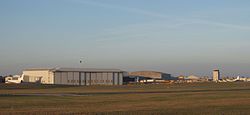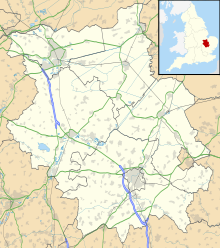Cambridge City Airport
Cambridge City Airport | |||||||||||||||||||
|---|---|---|---|---|---|---|---|---|---|---|---|---|---|---|---|---|---|---|---|
 | |||||||||||||||||||
 | |||||||||||||||||||
| Summary | |||||||||||||||||||
| Airport type | Public | ||||||||||||||||||
| Operator | Marshall Aerospace | ||||||||||||||||||
| Serves | Cambridge | ||||||||||||||||||
| Location | Cambridge and Teversham, Cambridgeshire, England | ||||||||||||||||||
| Opened | 1938 | ||||||||||||||||||
| Passenger services ceased | 24 March 2016 | ||||||||||||||||||
| Elevation AMSL | 47 ft / 14 m | ||||||||||||||||||
| Coordinates | 52°12′18″N 000°10′30″E / 52.20500°N 0.17500°E | ||||||||||||||||||
| Website | www | ||||||||||||||||||
| Map | |||||||||||||||||||
 | |||||||||||||||||||
| Runways | |||||||||||||||||||
| |||||||||||||||||||
| Statistics | |||||||||||||||||||
| |||||||||||||||||||
Cambridge City Airport (IATA: CBG, ICAO: EGSC) — previously Marshall Airport Cambridge UK — is a regional airport in Cambridgeshire, England. It is located on the eastern outskirts of Cambridge, south of Newmarket Road and west of the village of Teversham, 1.5 NM (2.8 km; 1.7 mi) from the centre of Cambridge and approximately 50 mi (80 km) from London.
Marshall of Cambridge Aerospace Limited has a CAA Public Use Aerodrome Licence (Number P433) that allows flights for the public transport of passengers or for flying instruction.[3] The airport is available for corporate and private use, and is home to four flying schools.
Since 2016 there have been no public scheduled flights from the airport.
History
Early years

Opened in 1938, when it replaced the old airfield at Fen Ditton,[4] the airport is owned and operated by Marshall Aerospace, a Cambridge-based company with many years' history servicing civilian and military contracts. The main building, which is a Grade II listed building, was designed by the architect Harold Tomlinson of the University of Cambridge and constructed in 1936–37.[5][6] For many years it was the base for the Cambridge University Air Squadron.
During the Second World War the site was used by the Royal Air Force as RAF Cambridge.[7]
The following units were here at some point:[7]
- No. 2 Civilian Anti-Aircraft Co-operation Unit RAF (July 1951 - March 1953)[8]
- No. 2 Squadron RAF between 1 August and 24 October 1940 with the Westland Lysander II & III[9]
- No. 4 (Supplementary) Flying Instructors School RAF (July 1940 - January 1942) became No. 4 Flying Instructors School RAF (January - April 1942) became No. 4 Flying Instructors School (Elementary) RAF (April 1942 - April 1943)[10]
- No. 5 Air Experience Flight RAF (July 1958 - September 1966 & September 1967 - ?)[11]
- A detachment from No. 16 Squadron RAF between 3 and 15 August 1940 with the Lysander I[12]
- No. 22 Elementary and Reserve Flying Training School RAF (February 1938 - September 1939)[13] became No. 22 Elementary Flying Training School RAF (September 1939 - May 1947)[14] became No. 22 Reserve Flying School RAF (May 1947 - June 1954)[15]
- A detachment from No. 26 Squadron RAF between 8 June and 3 September 1940 with the Lysander III[16]
- No. 54 Maintenance Unit RAF (October 1940 - March 1945)[17]
- No. 105 Gliding School RAF (May 1945 - September 1955)[18]
- A detachment from No. 239 Squadron RAF between 18 September 1940 and 22 January 1941 with the Lysander II[19]
- A detachment from No. 268 Squadron RAF between 30 September 1940 and 1 April 1941 with the Lysander II[20]
- Detachment of Roc Flight RAF (October - November 1940)[21]
Development since the 2000s

In 2000, a proposal was created to relocate the airport to a new site away from the city, which would have freed up 500 acres (200 ha) of land for the building of several thousand new homes. A study for a new airport was undertaken by Cambridgeshire County Council and planning permission was requested but withdrawn. In April 2010 Marshall Aerospace again announced it would not be moving from Cambridge Airport to make way for new housing. RAF Mildenhall, Waterbeach Barracks and RAF Wyton were considered as alternative sites but Marshall concluded there were "no suitable relocation options".[22][23]
In October 2008, to coincide with the opening of the new Marshall Business Aviation Centre, the airport's name was changed from Cambridge City Airport to Marshall Airport Cambridge UK.[24] The name was changed again to Cambridge Airport in 2011 as plans were announced for an expansion of the airport following the installation of instrument landing systems and new hangars.[25]
In 2012 the airport introduced charter flights to Italy as well as regular flights to the Channel Islands. These were the first scheduled flights from the airport since 2006.[26][27] In mid 2013 the airport completed a £1m refurbishment of its passenger terminal to handle new international airline services and in March 2015 British Airways commenced daily scheduled services to Gothenburg operated by franchise Sun-Air of Scandinavia.[28] Using 32 seat Dornier 328JET aircraft, to begin with 20 seats were reserved by AstraZeneca in order to connect its two main European offices.[29]
Passenger services were reported as "to end on 31 January 2016",[30] although British Airways/Sun-Air continued temporarily to operate flights from Cambridge to Gothenburg. Since 24 March 2016 tickets have not been available to the general public.[31] As of November 2017 the flights now originate in Manchester with a brief stop in Cambridge.[32]
In November 2019 the local FBO changed hands from ExecuJet to Cambridge Jet Centre which is managed by the Airport directly.[33][34]
Prospective closure
In May 2019, Marshall Aerospace and Defence Group, owners of the airport, announced that the airport would be closed to all traffic by 2030 at the latest. The Group plans to redevelop the airport site for around 12,000 homes and 5 million sq ft (0.46 million m2) of business premises.[35] As of May 2019, the Group was deciding between three potential airfields for its continuing operations: Duxford and Wyton in Cambridgeshire, and Cranfield in Bedfordshire.[35] In January 2020, the Group ruled out moving to Duxford due to incompatibility between the defence requirements of the Group and the requirements of the local traffic.[36] On 6 October 2020, Cranfield University and MADG announced that they had signed an option agreement for the potential relocation of Marshall Aerospace and Defence Group (MADG) to Cranfield Airport.[37] A spokesperson for MADG cautioned that "it is important to note that the signing of the option agreement does not represent a final decision".[37]
Statistics
See also
- List of airports in the United Kingdom
- Oxford-Cambridge Arc
- Transport in East Anglia
- Suckling Airways
References
Citations
- ^ Cambridge — EGSC Archived 11 July 2021 at the Wayback Machine.
- ^ UK Airport Statistics: 2007 — annual.
- ^ Civil Aviation Authority Aerodrome Ordinary Licences Archived 28 June 2007 at the Wayback Machine.
- ^ "Commercial Aviation:Fen Ditton Replaced". Flight, 28 October 1937, p. 430.
- ^ Newmarket Road: Cambridge Airport, Cambridge 2000.
- ^ Marshalls Cambridge Airport Control and Office Building, Teversham, British listed buildings. Retrieved 20 May 2013.
- ^ a b "Cambridge (Teversham)". Airfields of Britain Conservation Trust. Retrieved 28 September 2022.
- ^ Sturtivant, Hamlin & Halley 1997, p. 91.
- ^ Jefford 1988, p. 23.
- ^ Sturtivant, Hamlin & Halley 1997, p. 150.
- ^ Sturtivant, Hamlin & Halley 1997, p. 53.
- ^ Jefford 1988, p. 29.
- ^ Sturtivant, Hamlin & Halley 1997, p. 110.
- ^ Sturtivant, Hamlin & Halley 1997, p. 106.
- ^ Sturtivant, Hamlin & Halley 1997, p. 263.
- ^ Jefford 1988, p. 33.
- ^ Sturtivant, Hamlin & Halley 1997, p. 207.
- ^ Sturtivant, Hamlin & Halley 1997, p. 165.
- ^ Jefford 1988, p. 76.
- ^ Jefford 1988, p. 81.
- ^ Sturtivant, Hamlin & Halley 1997, p. 264.
- ^ Marshall says it will stay in Cambridge Archived 3 April 2010 at the Wayback Machine, Cambridge News.
- ^ Cambridge Airport will not move into Waterbeach Barracks Archived 24 September 2015 at the Wayback Machine, Eastern Daily Press, 21 July 2011.
- ^ New Name and New Executive Business Aviation facilities for Cambridge airport Archived 13 October 2008 at the Wayback Machine, Marshall Aerospace.
- ^ Cambridge Airport sets out plans for future, BBC Cambridgeshire news website, 13 January 2011.
- ^ Direct flights between Cambridge and Jersey return, BBC Jersey news website, 2 February 2012.
- ^ Cambridge Airport reinstates scheduled flights, BBC Cambridgeshire news website, 12 May 2012.
- ^ "Cambridge International Airport welcomes new route to Gothenburg - Cambridge Airport". Archived from the original on 17 February 2015. Retrieved 17 February 2015.
- ^ [1] Daily Telegraph
- ^ Cambridge Airport axes charter and scheduled passenger flights Archived 20 December 2015 at the Wayback Machine, Cambridge News, 2 December 2015.
- ^ SUN-AIR Timetable Archived 12 March 2016 at the Wayback Machine
- ^ [2] Flightradar24 BA8235
- ^ "New Cambridge Jet Centre takes flight". Cambridge City Airport. 4 November 2019. Retrieved 18 February 2020.
- ^ Epstein, Curt. "Cambridge UK FBO Reopens Under Airport Management". Aviation International News. Retrieved 18 February 2020.
- ^ a b "Marshall Aerospace plans to leave Cambridge Airport base by 2030". BBC News. 14 May 2019. Retrieved 20 May 2019.
- ^ "Marshall Aerospace and Defence Group rules out IWM Duxford as its new home". Cambridge Independent. 22 January 2020. Retrieved 18 February 2020.
- ^ a b "Cambridge's Marshall Aerospace signs 'option' for Cranfield University move". BBC News. 6 October 2020. Retrieved 8 October 2020.
Bibliography
- Jefford, C. G. (1988). RAF Squadrons. A comprehensive record of the movement and equipment of all RAF squadrons and their antecedents since 1912. Shrewsbury: Airlife. ISBN 1-85310-053-6.
- Sturtivant, R.; Hamlin, J.; Halley, J. (1997). Royal Air Force flying training and support units. UK: Air-Britain (Historians). ISBN 0-85130-252-1.
External links
![]() Media related to Cambridge Airport at Wikimedia Commons
Media related to Cambridge Airport at Wikimedia Commons


